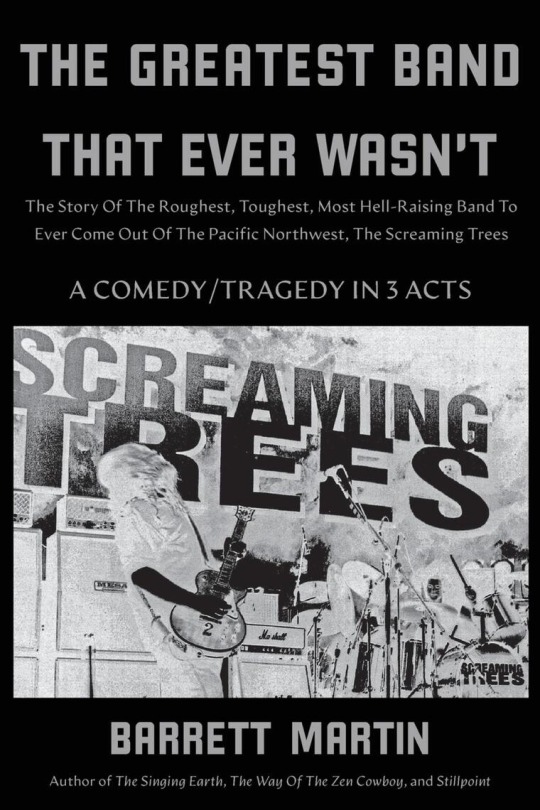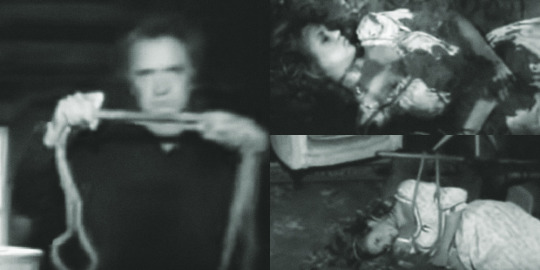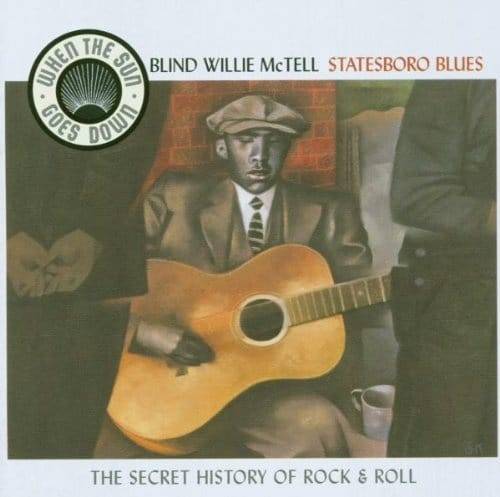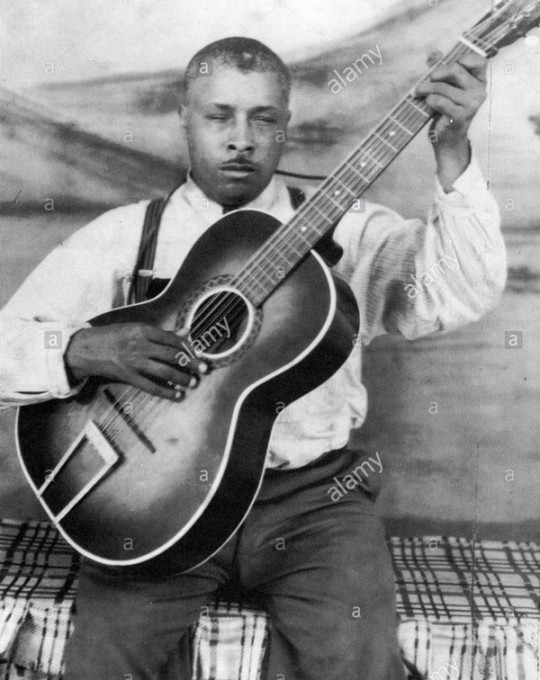#Blind Willie McTell
Text

Book Review: “The Greatest Band that Ever Wasn’t: The Story of the Roughest, Toughest, Most Hell-raising Band to Ever Come out of the Pacific Northwest, The Screaming Trees - A Comedy/Tragedy in 3 Acts” - by Barrett Martin
Screaming Trees nearly reunited in 2015 for a string of European and U.S. festival dates that would’ve featured Peter Buck on auxiliary rhythm guitar and represented the band’s largest payday.
But singer Mark Lanegan pulled the plug the day before an announcement was due. And with the subsequent deaths of Lanegan and bassist Van Conner, in 2022 and ’23, respectively, the Trees, who split in 2000, were left as an increasingly rare band that breaks up and stays that way.
This is the biggest revelation in Barrett Martin’s “The Greatest Band that Ever Wasn’t: The Story of the Roughest, Toughest, Most Hell-raising Band to Ever Come out of the Pacific Northwest, The Screaming Trees - A Comedy/Tragedy in 3 Acts.” That unwieldy title inadvertently encapsulates the main problem with the otherwise-interesting book from the man who replaced Mark Pickerel as drummer for the Trees’ during their final decade.
Namely, Barrett needed a co-writer and/or a strong editor. As published, “The Greatest Band that Ever Wasn’t” is messy and littered with grammatical errors, typos, redundancies and a tendency to be verbose for verbosity’s sake. The comedy/tragedy addendum, meanwhile, is a misnomer, as the book by the multi-instrumentalist who also has played with Skin Yard; co-founded Mad Season and Tuatara; and was a touring member of Buck’s R.E.M., reads like a traditional rock memoir, albeit a poorly written one.
All of this said, Barrett presents 33 enlightening stories about the poorly documented Trees across 204 pages and it’s refreshing to read a rock ‘n’ roll memoir by a musician whose memories are all fond and who has no desire to settle scores in public. That Martin loved his band and respected his bandmates, also including guitarist/composer Gary Lee Conner and latter-day rhythm guitarist Joshua Homme, is obvious.
Martin also reveals that Lanegan recorded two a cappella Blind Willie McTell covers - not named - for a soundtrack, also not named, the drummer-cum-author is producing. A good editor would’ve done something to close the gaping hole in this tantalizing tidbit and ensured readers were not left with terrific content presented poorly.
Grade card: “The Greatest Band that Ever Wasn’t: The Story of the Roughest, Toughest, Most Hell-raising Band to Ever Come out of the Pacific Northwest, The Screaming Trees - A Comedy/Tragedy in 3 Acts” - by Barrett Martin - C+
1-3-24
#the greatest band that ever wasn’t#screaming trees#barrett martin#mark pickerel#mark lanegan#van conner#gary lee conner#skin yard#mad season#tuatara#joshua homme#queens of the stone age#peter buck#r.e.m.#blind willie mctell
4 notes
·
View notes
Text
youtube
I’m pretty sure Townes saying “Lord, Lord, Lord. Lord, Lord, Lord, Lord, Lordy, Lord” is my sexual orientation (also whenever he sings songs from the 1930s in general…)
5 notes
·
View notes
Text

Jack White... Blind Willie McTell... Meg White... Loretta Lynn
48 notes
·
View notes
Text
They’ve got me ‘cused for murder but I haven’t even harmed a man. They’ve got me charged with burglin’ and I haven’t even raised my hand.
…
They’ve got me ‘cused for forging and I can’t even write my name. And my eyes still don’t miss, my baby left my poor heart in pain.
2 notes
·
View notes
Audio

Taj Mahal - Statesboro Blues (1968)
William Samuel McTier (Blind Willie McTell)
from:
"Taj Mahal" (LP)
"Everybody's Got to Change Sometime" / "Statesboro Blues" (Single)
Blues | Electric Blues | Slide Guitar
JukeHostUK
(left click = play)
(320kbps)
Personnel:
Taj Mahal: Vocals / Blues Harp
Jesse Ed Davis: Lead Guitar / Slide Guitar
Ry Cooder: Rhythm Guitar
James Thomas: Bass
Sanford "Sandy" Konikoff: Drums
Arranged by Taj Mahal
Produced by David Rubinson
Recorded:
@ CBS Studios
in San Francisco, California USA
during August, 1967
Album Released:
in January, 1968
Single Released:
on March 5, 1968
Columbia Records

Taj Mahal | Jesse Ed Davis | Ry Cooder | James Thomas | Sandy Konikoff
#Taj Mahal#Blind Willie McTell#Statesboro Blues#1960's#Blues#Electric Blues#William Samuel McTier#Slide Guitar#David Rubinson
11 notes
·
View notes
Audio
6 notes
·
View notes
Text
youtube
"Statesboro Blues" with Taj Mahal and Gregg Allman.
__________________
Statesboro Blues
Songwriter: Blind Willie McTell
Wake up momma, turn your lamp down low;
Wake up momma, turn your lamp down low.
You got no nerve baby, to turn Uncle John from your door.
I woke up this morning, I had them Statesboro Blues,
I woke up this morning, had them Statesboro Blues.
Well, I looked over in the corner, and Grandpa seemed to have them too.
Well my momma died and left me,
My poppa died and left me,
I ain't good looking baby,
But I'm somewhat sweet and kind.
I'm goin' to the country, baby do you wanna go?
But if you can't make it baby, your sister Lucille said she wanna go.
(and I sure will take her).
I love that woman, better than any woman I've ever seen;
Well, I love that woman, better than any woman I've ever seen.
Well, now, she treat me like a king, yeah, yeah, yeah,
And she look like a dog gone queen.
Wake up momma, turn your lamp down low.
Wake up momma, turn your lamp down low.
You got no nerve babe, to turn Uncle John from your door.
13 notes
·
View notes
Text
Delia's Gone: True Crime Murder Ballads Pt. 1

If you're a fan of old school folk, country, and jazz, chances are you've heard a song or two about Delia. But what you may not know is that these songs are inspired by real people. Songwriters through the years have taken varying degrees of creative license when telling the tale of Delia's fate, and the actual events surrounding her life and death are largely forgotten. She was a gambler in some versions, a prostitute in others. Today, the most well known version describes her as an evil woman whose luck ran out when she messed with the wrong guy.
In reality, Delia Green was a 14-year-old Black girl living in Savannah, Georgia in 1900 when she was shot and killed at a Christmas Eve party by 15-year-old Moses Houston. Intoxicated, Houston began publicly bragging to party goers about his sexual relationship with Green, using language to imply some sort of ownership over her. She denied it and rejected his claims, calling him a "son of a bitch" in the process. Ego bruised, he responded by shooting her in the groin. She succumbed to her injuries hours later, on Christmas day, and was buried in an unmarked grave in Savannah's Laurel Grove Cemetery. Houston was sentenced to life in prison, but only served 13 years before being granted parole.
Tragic circumstances like these often proved to be fertile grounds for songwriters, who rushed to use jaw-dropping breaking news stories to inspire fresh material. Though the original writers have been lost to time, Library of Congress field recordings suggest Delia Green was a popular lyrical subject from the time of her death until the end of the 1910s. While the tale of Green's murder fell out of favor for several decades, it returned with a vengeance by the middle of the century. Piedmont blues guitarist Blind Willie McTell recorded "Delia" and "Little Delia" in the 1940s, and Bahamas-based calypso musician Blake Alphonso Higgs recorded "Delia's Gone" in the 1950s. From there, the American folk music revival aroused a flurry of "Delia" covers, including from Pete Seeger, Bob Dylan, Josh White, and Burl Ives.
Johnny Cash released his own version in 1962, and another in 1994, the latter accompanied by a grotesquely glamorous Anton Corbijn-directed music video starring supermodel Kate Moss. Throughout the clip, Moss is posed dead-eyed beneath a noose and motionless at the bottom of a grave, dirt raining down on her. Cash, when not carrying Moss' lifeless body around, stands in a cemetery strumming his guitar, "DELIA" printed on the cross behind him. The song helped propel Cash's career comeback, with the LA Times proclaiming "Delia's Gone, But Man in Black's Back."

The recording itself is also particularly nasty. Adding verses that describe Delia as "cold and mean," Cash submits his actions as a blueprint for other men to follow: "So if your woman's devilish, you can let her run or you can bring her down and do her like Delia got done." While this rendition is particularly brutal considering the story behind the song, it's worth noting that this cold-hearted interpretation potentially matches the emotions of the moment more truthfully. During his confession, Houston reportedly exhibited zero remorse, saying he'd do it all over again if given the chance.
Not all versions are so cruel, however. Harry Belafonte released multiple stirring renditions, first in 1954 and again in 1967, lyrics rewritten to present the reason for Delia's mysterious absence as unknown. He also movingly covered the original in 1959, making him a particularly skilled interpreter of this story. And David Bromberg's 2016 re-recording is another standout among dozens of "Delia" performances.
In 2020, 120 years after her death, the non-profit Killer Blues Headstone Project raised the funds to finally deliver Green her own grave marker. It's a thoughtful tribute to the girl who has inspired countless musicians to pick up their guitar, but whose actual existence has been largely forgotten. So the next time you're singing along with "one more round, Delia's gone," remember the child whose death inspired those words. Rest in peace, Delia Green.
Follow me: Instagram / TikTok / Amazon
#delia green#delia's gone#delia#true crime#savannah#georgia#murder ballad#murder#blind willie mctell#little delia#pete seeger#bob dylan#johnny cash#burl ives#kate moss#harry belafonte#david bromberg#music
16 notes
·
View notes
Text

AllMusic Staff Pick
Blind Willie McTell
Statesboro Blues
Blind Willie McTell recorded these 17 tracks for RCA Victor between 1927 and 1932. This revelatory material, especially "Dark Night Blues," and "Stole Rider Blues," is recommended to anyone not familiar with the prewar blues master of the 12-string guitar.
- Al Campbell
0 notes
Text
youtube
Song Review: Woody Platt feat. Del McCoury - “Broke Down Engine”
Woody Platt’s post-Steep Canyon Rangers solo career is off to an auspicious start with the Del McCoury-assisted remake of Blind Willie McTell’s “Broke Down Engine.”
The infectious bluegrass track announces the spring 2024 arrival of Platt’s debut solo album - title TBA - and also features Bryan Sutton on guitar, Barry Bales on bass, Daren Shumaker on mandolin and Bennett Sullivan on banjo.
The players are in top form, soloing across most of the track as Bales holds it together. McCoury and Platt trade lines throughout and when their voices come together, it’s a harmonic convergence that should’ve happened decades ago.
Platt left the Rangers in 2022.
Grade card: Woody Platt feat. Del McCoury - “Broke Down Engine” - A+
11/13/23
#Youtube#woody platt#steep canyon rangers#del mccoury#blind willie mctell#bryan sutton#punch brothers#barry bales#alison krauss and union station#daren shumaker#bennett sullivan#broke down engine
0 notes
Text
youtube
McTell kinda day.
0 notes
Audio
Your Southern Can Is Mine by Blind Willie McTell
0 notes
Video
youtube
The song Statesboro Blues was written and recorded in 1928 Artist Blind Willie McTell in the traditional Piedmont Blues style. In 1971, it was the opening track on The Allman Brothers At Fillmore East album and became one of the greatest rock songs of all time. In between, it was recorded in 1968 by Taj Mahal, who blended the original Blues style with Rock music. It is that version of the song that influenced The Allman Brothers Band to adapt it to their style. With that in mind, I’m kicking off the weekend with Taj Mahal and his version of Statesboro Blues.
Blind Willie McTell version: https://www.youtube.com/watch?v=fnWxZtI3ONY
0 notes

